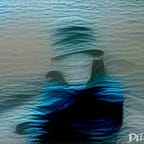I’m Not A Painter By Alexander Reben
Exhibition at Gazelli Art House in London
On 9th September, 2022 Gazelli Art House welcomes the public with a solo exhibition by American artist and researcher Alexander Reben. Entitled “I’m Not A Painter”, the show is part of the GAZELL.iO Project Space and aims to expand the exploration of the relationship between human/machine and artist/artificial intelligence (AI) that has become so crucial in the last few years in the art field.
Located in the heart of Mayfair in London, GAZELL.iO is described as “the digital arm of Gazelli Art House”. It boasts a permanently installed VR Library, NFT drops and collaborations, an online Residency program, and a Project Space that is designed for exhibitions. In 2015, the interest in showcasing the best of both emerging and established digital artists led to the creation of four weeks online Residency. In 2020, the concern to connect the physical with the digital, providing artists with the possibility of exhibiting their works also in combination with NFT drops, gave birth to Project Space.
Reben’s background combines Robotics and Applied Math with Media Arts and Sciences. An artist particularly sensitive to translating the entanglement between human and artificial, he places the collaboration with artificial intelligence in making art at the center of his practice. His approach, summarized in the statement “art as experiment”, mixes perceptual manipulation, artificial philosophy and synthetic psychology. The rigor of the researcher, combined with the vision of the artist, gives life to works that make us reflect on our connection and co-evolution with the artificial creations that swarm our digital age.
Reben is among the few artists who are experimenting with artificial intelligence and oil painting. “I’m Not A Painter”, however, is not the artist’s first work to use paint on canvas combined with AI. Before this, other works should be mentioned including the series “amalGAN” and “AI Ami?”. The first is based on an AI algorithm that reads the brainwaves and signals of the artist’s body and then produces artistic outputs that are sent to anonymous painters in China to be translated on canvas. In the second, an algorithm provides the description of a series of artworks, which are then physically painted by the artist or collaborators. “I’m Not A Painter” thus carries on the idea that, in the creative process, technology should not be seen only as a simple tool of execution, but can become a partner.
In order to create the works exhibited at Gazelli Art House, Reben relies on two AIs that collaborate with each other. A first AI generates the texts that are used to create the images on which to base the paintings. To do this, the artist employs a custom neural network combined with text generation (GPT-3). The second AI, on the other hand, produces the final images using a system of synthesis between text and image (DALL · E 2). The outputs are then approved by Reben who chooses the best pieces to be delivered to the curator who, in turn, will decide which ones to paint on canvas.
“I’m Not A Painter” explores the interaction between humans and computers, but carries on the discussions that have been circulating for some time in the field known as AI Art. Framed in the context of AI-based technology, such discussions question the nature of art and wonder who the artist is or what creativity means in our digital age. The mixed installation of wallpaper and oil painting is a fusion of surreal images that create a progressive sense of unease in the beholder. Remote yet familiar, the imagery envelops the viewer in the uncanny and prompts questions about curation, control, authenticity, and authorship.
Reben’s work will be presented first in Venice during the ULTRAMARIN immersive exhibition, which is curated by Ulrich Schrauth who is the Artistic Director of VRHAM!
The exhibition will close on October 8, 2022.
